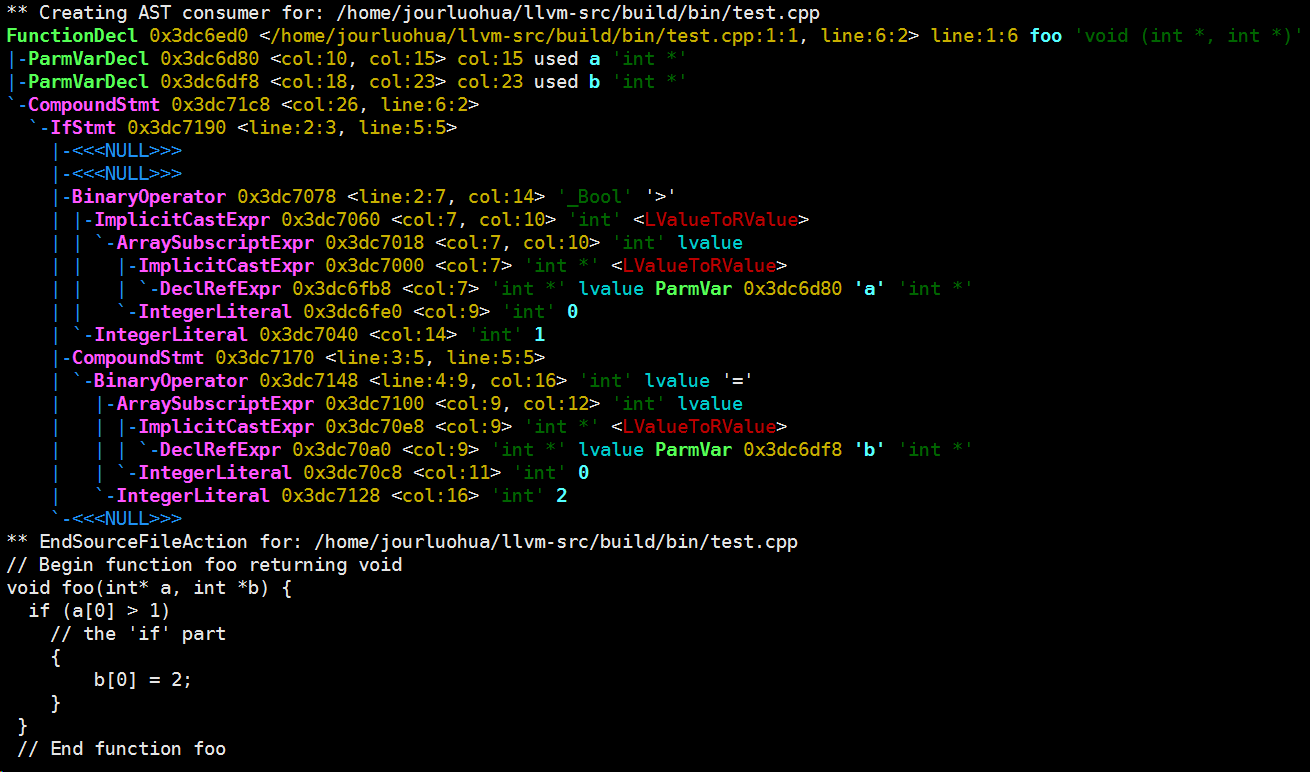clang教程之实现源源变化
声明:本教程来自于Eli Bendersky's website
众所周知,LLVM是一个自由软件项目,它是一种编译器基础设施,以C++写成。其发端源于2000年伊利诺伊大学厄巴纳-香槟分校(UIUC)的维克拉姆·艾夫(Vikram Adve)与其第一个博士生克里斯·拉特纳(Chris Lattner)的研究,彼时他们想要为所有静态及动态语言创造出动态的编译技术。现在使用LLVM来作为中端(middle-end)优化和后端目标代码生成的人很多,开源中也有很多基于LLVM进行二次开发的工具,比如之前NVIDIA贡献的nvptx的code-generator和klee。而llvm的前端,在llvm3(具体版本忘记了)之前使用的是GCC,之后使用的是clang。clang这个前端提供了很多sema静态分析工具,可以说已经超出了一般的编译器前端的范畴。
clang的功能如此强大,但是却很少发现有人对这部分知识进行介绍。我这里选取了Eli Bendersky的博客进行翻译介绍,作者现在是Google TensorFlow组的工程师,中间添加了我自己的理解,如果有错误,望大家指出。
首先介绍一下效果,输入是这样的一段带if的代码
1 void foo(int* a, int *b) { 2 if (a[0] > 1) { 3 b[0] = 2; 4 } 5 }
经过自己做的工具后,完成以下两部分的功能:
1. 识别if的true-body和false-body,并添加相应的注释
2. 识别函数入口和函数出口,添加注释
介绍一下主要的实现思路:
1. 创建ClangTool,也就是使用libTooling的方式,解析输入的参数,将第1个参数作为源码文件进行读取
2. 将源码送到ASTConsumer中,进行解析
3. ASTConsumer中,重载HandleTopLevelDecl识别所有的函数声明
4. 调用MyASTVisitor这个类(继承至TheWriter)中的VisitStmt函数,对所有的语句进行遍历,调用VisitFunctionDecl函数,对函数声明进行处理
5. 在遍历中识别是否是IfStmt,然后对ture-body和false-body进行识别,并添加注释
6. 将修改完的送回TheRewriter,进行写回
现在粘一下源码LoopConvert.cpp

//------------------------------------------------------------------------------ // Tooling sample. Demonstrates: // // * How to write a simple source tool using libTooling. // * How to use RecursiveASTVisitor to find interesting AST nodes. // * How to use the Rewriter API to rewrite the source code. // // Eli Bendersky (eliben@gmail.com) // This code is in the public domain //------------------------------------------------------------------------------ #include <sstream> #include <string> #include "clang/AST/AST.h" #include "clang/AST/ASTConsumer.h" #include "clang/AST/RecursiveASTVisitor.h" #include "clang/Frontend/ASTConsumers.h" #include "clang/Frontend/CompilerInstance.h" #include "clang/Frontend/FrontendActions.h" #include "clang/Rewrite/Core/Rewriter.h" #include "clang/Tooling/CommonOptionsParser.h" #include "clang/Tooling/Tooling.h" #include "llvm/Support/raw_ostream.h" using namespace clang; using namespace clang::driver; using namespace clang::tooling; static llvm::cl::OptionCategory ToolingSampleCategory("Tooling Sample"); // By implementing RecursiveASTVisitor, we can specify which AST nodes // we're interested in by overriding relevant methods. class MyASTVisitor : public RecursiveASTVisitor<MyASTVisitor> { public: MyASTVisitor(Rewriter &R) : TheRewriter(R) {} bool VisitStmt(Stmt *s) { // Only care about If statements. if (isa<IfStmt>(s)) { IfStmt *IfStatement = cast<IfStmt>(s); Stmt *Then = IfStatement->getThen(); TheRewriter.InsertText(Then->getLocStart(), "// the 'if' part ", true, true); Stmt *Else = IfStatement->getElse(); if (Else) TheRewriter.InsertText(Else->getLocStart(), "// the 'else' part ", true, true); } return true; } bool VisitFunctionDecl(FunctionDecl *f) { // Only function definitions (with bodies), not declarations. if (f->hasBody()) { Stmt *FuncBody = f->getBody(); // Type name as string QualType QT = f->getReturnType(); std::string TypeStr = QT.getAsString(); // Function name DeclarationName DeclName = f->getNameInfo().getName(); std::string FuncName = DeclName.getAsString(); // Add comment before std::stringstream SSBefore; SSBefore << "// Begin function " << FuncName << " returning " << TypeStr << " "; SourceLocation ST = f->getSourceRange().getBegin(); TheRewriter.InsertText(ST, SSBefore.str(), true, true); // And after std::stringstream SSAfter; SSAfter << " // End function " << FuncName; ST = FuncBody->getLocEnd().getLocWithOffset(1); TheRewriter.InsertText(ST, SSAfter.str(), true, true); } return true; } private: Rewriter &TheRewriter; }; // Implementation of the ASTConsumer interface for reading an AST produced // by the Clang parser. class MyASTConsumer : public ASTConsumer { public: MyASTConsumer(Rewriter &R) : Visitor(R) {} // Override the method that gets called for each parsed top-level // declaration. bool HandleTopLevelDecl(DeclGroupRef DR) override { for (DeclGroupRef::iterator b = DR.begin(), e = DR.end(); b != e; ++b) { // Traverse the declaration using our AST visitor. Visitor.TraverseDecl(*b); (*b)->dump(); } return true; } private: MyASTVisitor Visitor; }; // For each source file provided to the tool, a new FrontendAction is created. class MyFrontendAction : public ASTFrontendAction { public: MyFrontendAction() {} void EndSourceFileAction() override { SourceManager &SM = TheRewriter.getSourceMgr(); llvm::errs() << "** EndSourceFileAction for: " << SM.getFileEntryForID(SM.getMainFileID())->getName() << " "; // Now emit the rewritten buffer. TheRewriter.getEditBuffer(SM.getMainFileID()).write(llvm::outs()); } std::unique_ptr<ASTConsumer> CreateASTConsumer(CompilerInstance &CI, StringRef file) override { llvm::errs() << "** Creating AST consumer for: " << file << " "; TheRewriter.setSourceMgr(CI.getSourceManager(), CI.getLangOpts()); return llvm::make_unique<MyASTConsumer>(TheRewriter); } private: Rewriter TheRewriter; }; int main(int argc, const char **argv) { CommonOptionsParser op(argc, argv, ToolingSampleCategory); ClangTool Tool(op.getCompilations(), op.getSourcePathList()); // ClangTool::run accepts a FrontendActionFactory, which is then used to // create new objects implementing the FrontendAction interface. Here we use // the helper newFrontendActionFactory to create a default factory that will // return a new MyFrontendAction object every time. // To further customize this, we could create our own factory class. return Tool.run(newFrontendActionFactory<MyFrontendAction>().get()); }
源码介绍到这里,现在说一下编译,这种项目编译起来比较麻烦……
我选择的环境是Ubuntu16.04+LLVM4.0+Clang4.0 的环境,我已经发过一个使用binary进行安装llvm教程,当然,那个教程不适用于这里,我改天会再发一个教程,如何使用源码进行编译
这里假设大家和我使用的是相同的环境,因为LLVM4.0到5.0经历了比较大的改动,4.0的代码在5.0上正常编译时非常正常的。
1. 在源码的clang/tools文件夹下(大概是~/llvm-src/llvm-4.0.0.src/tools/clang/tools/下),新建文件夹extra
在文件夹内新建CMakeLists.txt,写入
add_subdirectory(loop-convert)
这里是告诉cmake工具,下边还有一级目录,叫做loop-convert
2. 再在extra中新建loop-convert文件夹
3. 在loop-convert中新建CMakeLists.txt,写入
set(LLVM_LINK_COMPONENTS support) add_clang_executable(loop-convert LoopConvert.cpp ) target_link_libraries(loop-convert clangTooling clangBasic clangASTMatchers )
大概意思是添加LLVM的支持,使用 LoopConvert.cpp来编译出一个叫loop-convert的程序,然后将loop-convert和 clangTooling clangBasic clangASTMatchers链接在一起,这几个都是clang的库
现在loop-convert文件夹中应该有CMakeLists.txt LoopConvert.cpp两个文件
现在的目录结构如下
clang/tools ->extra -> loop-convert ->CMakeLists.txt
... CMakeLists.txt LoopConvert.cpp
4. 现在,重新使用cmake生成Makefile文件,make后就能得到loop-convert了
loop-convert在 where_you_build/bin/下边(我是~/llvm-src/build/bin)
现在进行测试
首先编辑一个带if的程序(不推荐包含头文件,因为AST打印的时候,会把头文件也打印出来,不方便查看)
我使用的test.cpp如下
void foo(int* a, int *b) { if (a[0] > 1) { b[0] = 2; } }
使用./loop-convert test.cpp -- 命令进行测试, --表示没有特别的参数

